李光耀【英文】
- 格式:pdf
- 大小:75.58 KB
- 文档页数:1
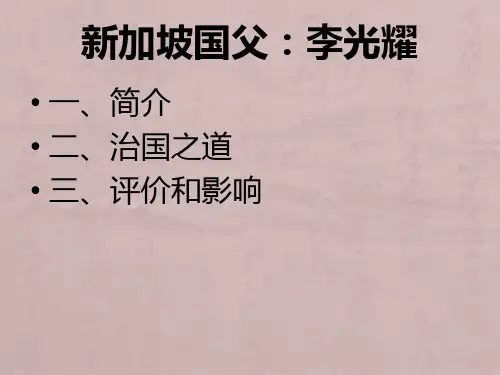
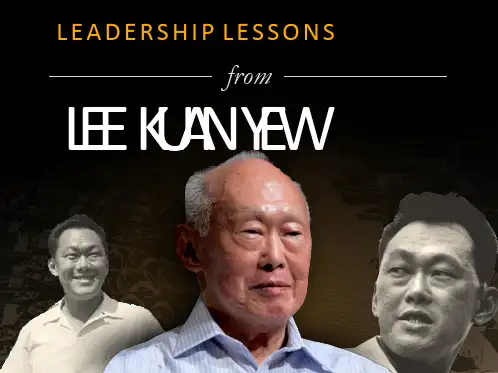

The Papers of Lee Kuan Yew: Speeches, Interviews and Dialogues (1950–1990) Compiled by the National Archives of SingaporeSet price (print): US$2,800 per set for the first phase (1950–1990)Hardback: 978-981-4352-26-0 (set) Price: USD2800.00 (before GST).Pre-pub price at USD 2,499.00 (before GST) – valid till end SepLeather edition: 978-981-4369-41-1 (set) Price: USD3600.00 (before GST) – with autographed About the compilerAs the official custodian of the corporate memory of the government, the National Archives of Singapore (NAS) manages public records and provides advice to government agencies on records management. From government files, private memoirs, historical maps and photographs to oral-history interviews and audio-visual materials, NAS is responsible for the collection, preservation and management of Singapore’s public and private archival records, some of which date back to the early 19th century. Its vast repository of archival materials makes NAS an important research center for those in search of information about the country’s history. NAS also promotes public interest in the nation’s history and heritage through educational programs and exhibitions.Visit NAS at .sg/NASSeries DescriptionLee Kuan Yew (1923– ) is a prominent Singapore statesman. He was the first prime minister of the Republic of Singapore and governed the island nation for three decades (1959–1990). By the time he stepped down to enable a smooth leadership renewal, he had become the world's longest-serving prime minister. He was Singapore’s senior minister (SM) from 1990 to 2004 and then minister mentor (MM) from 2004 to 2011. As the co-founder and first secretary-general of the People's Action Party (PAP), he led the party to eight victories from 1959 to 1990, oversaw the separation of Singapore from Malaysia in 1965, and engineered its subsequent transformation from an underdeveloped colonial outpost with no natural resources into a First-World Asian Tiger. He has remained one of the most influential political figures in Southeast Asia.The Papers of Lee Kuan Yew: Speeches, Interviews and Dialogues is a compilation of all the speeches, interviews, and press conference presentations delivered by Lee Kuan Yew from 1950 through 2011. The first phase of this project covers four decades from 1950 to 1990, including the period before Lee became the prime minister of Singapore and the period when he served as the prime minister. The project will tentatively comprise ten volumes covering the following years: 1950–1962 (Volume1), 1963–July 1965 (Volume 2), August 1965–1966 (Volume 3), 1967–1968 (Volume 4), 1969–1971 (Volume 5), 1972–1974 (Volume 6), 1975–1977 (Volume 7), 1978–1981 (Volume 8), 1982–1984 (Volume 9), and 1985–1990 (Volume 10). The scheduled date of publication is September 2011.ISBN-13 ISBN-10 Volume1 978-981-4352-15-4 981-4352-15-2The Papers of Lee Kuan Yew: Speeches,Interviews and Dialogues Volume 12 978-981-4352-16-1 981-4352-16-0 The Papers of Lee Kuan Yew: Speeches,Interviews and Dialogues Volume 23 978-981-4352-17-8 981-4352-17-9 The Papers of Lee Kuan Yew: Speeches,Interviews and Dialogues Volume 34 978-981-4352-18-5 981-4352-18-7 The Papers of Lee Kuan Yew: Speeches,Interviews and Dialogues Volume 45 978-981-4352-19-2 981-4352-19-5 The Papers of Lee Kuan Yew: Speeches,Interviews and Dialogues Volume 56 978-981-4352-20-8 981-4352-20-9 The Papers of Lee Kuan Yew: Speeches,Interviews and Dialogues Volume 67 978-981-4352-21-5 981-4352-21-7 The Papers of Lee Kuan Yew: Speeches,Interviews and Dialogues Volume 78 978-981-4352-22-2 981-4352-22-5 The Papers of Lee Kuan Yew: Speeches,Interviews and Dialogues Volume 89 978-981-4352-23-9 981-4352-23-3 The Papers of Lee Kuan Yew: Speeches,Interviews and Dialogues volume 910 978-981-4352-24-6 981-4352-24-1 The Papers of Lee Kuan Yew: Speeches,Interviews and Dialogues volume 10。
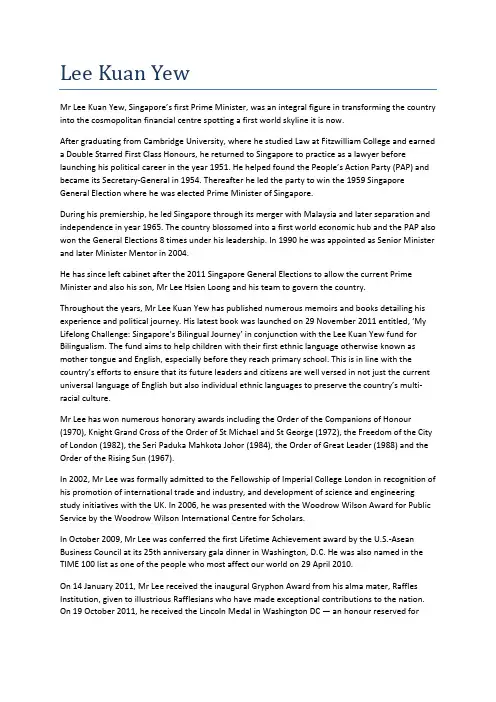
Lee Kuan YewMr Lee Kuan Yew, Singapore’s first Prime Minister, was an integral figure in transforming the country into the cosmopolitan financial centre spotting a first world skyline it is now.After graduating from Cambridge University, where he studied Law at Fitzwilliam College and earned a Double Starred First Class Honours, he returned to Singapore to practice as a lawyer before launching his political career in the year 1951. He helped found the People’s Action Party (PAP) and became its Secretary‐General in 1954. Thereafter he led the party to win the 1959 Singapore General Election where he was elected Prime Minister of Singapore.During his premiership, he led Singapore through its merger with Malaysia and later separation and independence in year 1965. The country blossomed into a first world economic hub and the PAP also won the General Elections 8 times under his leadership. In 1990 he was appointed as Senior Minister and later Minister Mentor in 2004.He has since left cabinet after the 2011 Singapore General Elections to allow the current Prime Minister and also his son, Mr Lee Hsien Loong and his team to govern the country.Throughout the years, Mr Lee Kuan Yew has published numerous memoirs and books detailing his experience and political journey. His latest book was launched on 29 November 2011 entitled, ‘My Lifelong Challenge: Singapore's Bilingual Journey’ in conjunction with the Lee Kuan Yew fund for Bilingualism. The fund aims to help children with their first ethnic language otherwise known as mother tongue and English, especially before they reach primary school. This is in line with the country’s efforts to ensure that its future leaders and citizens are well versed in not just the current universal language of English but also individual ethnic languages to preserve the country’s multi‐racial culture.Mr Lee has won numerous honorary awards including the Order of the Companions of Honour (1970), Knight Grand Cross of the Order of St Michael and St George (1972), the Freedom of the City of London (1982), the Seri Paduka Mahkota Johor (1984), the Order of Great Leader (1988) and the Order of the Rising Sun (1967).In 2002, Mr Lee was formally admitted to the Fellowship of Imperial College London in recognition of his promotion of international trade and industry, and development of science and engineering study initiatives with the UK. In 2006, he was presented with the Woodrow Wilson Award for Public Service by the Woodrow Wilson International Centre for Scholars.In October 2009, Mr Lee was conferred the first Lifetime Achievement award by the U.S.‐Asean Business Council at its 25th anniversary gala dinner in Washington, D.C. He was also named in the TIME 100 list as one of the people who most affect our world on 29 April 2010.On 14 January 2011, Mr Lee received the inaugural Gryphon Award from his alma mater, Raffles Institution, given to illustrious Rafflesians who have made exceptional contributions to the nation. On 19 October 2011, he received the Lincoln Medal in Washington DC — an honour reserved forpeople who have exemplified the legacy and character embodied by former US President Abraham Lincoln.Mr Lee is married to the late Mdm Kwa Geok Choo with whom they have two sons and a daughter. A Queen’s Scholar from Malaya and also an outstanding Cambridge law graduate, Mdm Kwa has been credited for standing by her spouse and assisting him through the development of the nation. In recognition of her remarkable achievements, the Singapore Management University (SMU) has named its new Law Library, a new Scholars Programme and a top Law Graduate Award after her.Amongst the hobbies Mr Lee has, he enjoys cycling and swimming.。
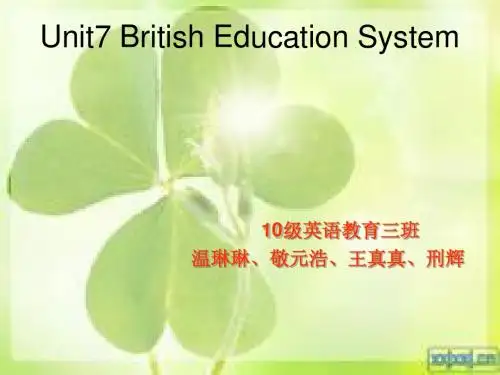
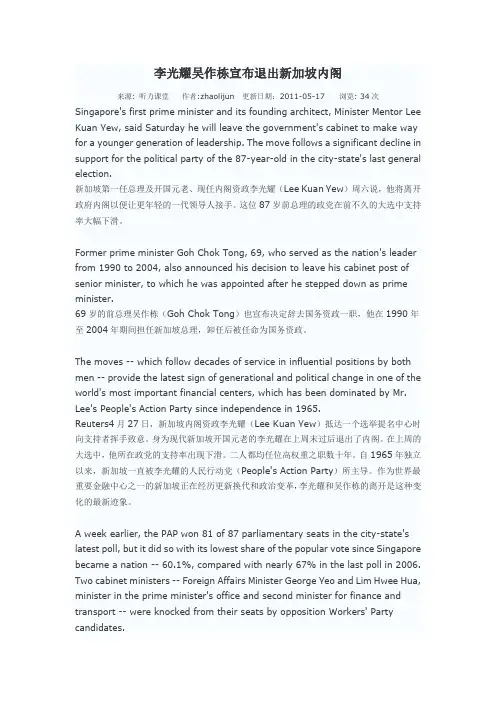
李光耀吴作栋宣布退出新加坡内阁来源: 听力课堂作者:zhaolijun 更新日期:2011-05-17 浏览: 34次Singapore's first prime minister and its founding architect, Minister Mentor Lee Kuan Yew, said Saturday he will leave the government's cabinet to make way for a younger generation of leadership. The move follows a significant decline in support for the political party of the 87-year-old in the city-state's last general election.新加坡第一任总理及开国元老、现任内阁资政李光耀(Lee Kuan Yew)周六说,他将离开政府内阁以便让更年轻的一代领导人接手。
这位87岁前总理的政党在前不久的大选中支持率大幅下滑。
Former prime minister Goh Chok Tong, 69, who served as the nation's leader from 1990 to 2004, also announced his decision to leave his cabinet post of senior minister, to which he was appointed after he stepped down as prime minister.69岁的前总理吴作栋(Goh Chok Tong)也宣布决定辞去国务资政一职,他在1990年至2004年期间担任新加坡总理,卸任后被任命为国务资政。
The moves -- which follow decades of service in influential positions by both men -- provide the latest sign of generational and political change in one of the world's most important financial centers, which has been dominated by Mr. Lee's People's Action Party since independence in 1965.Reuters4月27日,新加坡内阁资政李光耀(Lee Kuan Yew)抵达一个选举提名中心时向支持者挥手致意。
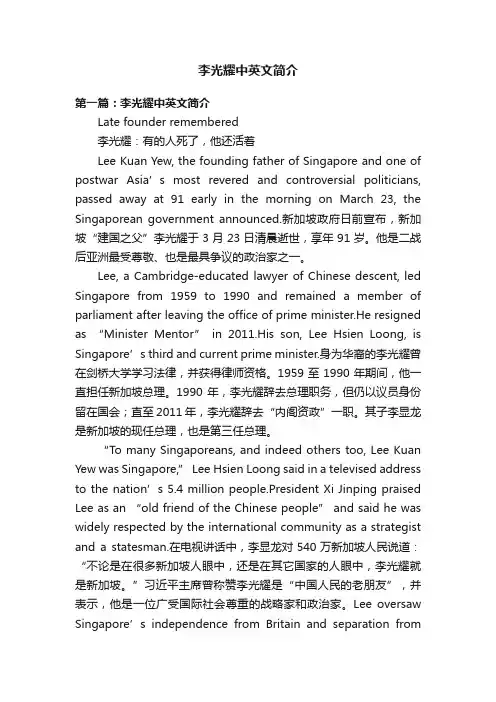
李光耀中英文简介第一篇:李光耀中英文简介Late founder remembered李光耀:有的人死了,他还活着Lee Kuan Yew, the founding father of Singapore and one of postwar Asia’s most revered and controversial politicians, passed away at 91 early in the morning on March 23, the Singaporean government announced.新加坡政府日前宣布,新加坡“建国之父”李光耀于3月23日清晨逝世,享年91岁。
他是二战后亚洲最受尊敬、也是最具争议的政治家之一。
Lee, a Cambridge-educated lawyer of Chinese descent, led Singapore from 1959 to 1990 and remained a member of parliament after leaving the office of prime minister.He resigned as “Minister Mentor” in 2011.His son, Lee Hsien Loong, is Singapore’s third and current prime minister.身为华裔的李光耀曾在剑桥大学学习法律,并获得律师资格。
1959至1990年期间,他一直担任新加坡总理。
1990年,李光耀辞去总理职务,但仍以议员身份留在国会;直至2011年,李光耀辞去“内阁资政”一职。
其子李显龙是新加坡的现任总理,也是第三任总理。
“To many Singaporeans, and indeed others too, Lee Kuan Yew was Singapore,” Lee Hsien Loong said in a televised address to the nation’s 5.4 million people.President Xi Jinping praised Lee as an “old friend of the Chinese people” and said he was widely respected by the international community as a strategist and a statesman.在电视讲话中,李显龙对540万新加坡人民说道:“不论是在很多新加坡人眼中,还是在其它国家的人眼中,李光耀就是新加坡。
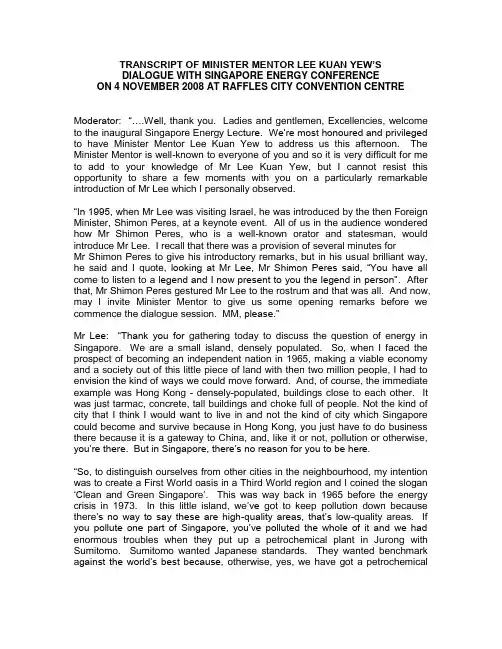
TRANSCRIPT OF MINISTER MENTOR LEE KUAN YEW’SDIALOGUE WITH SINGAPORE ENERGY CONFERENCE ON 4 NOVEMBER 2008 AT RAFFLES CITY CONVENTION CENTRE Moderator: “….Well, thank you. Ladies and gentlemen, Excellencies, welcome to the inaugural Singapore Energy Lec ture. We‟re most honoured and privileged to have Minister Mentor Lee Kuan Yew to address us this afternoon. The Minister Mentor is well-known to everyone of you and so it is very difficult for me to add to your knowledge of Mr Lee Kuan Yew, but I cannot resist this opportunity to share a few moments with you on a particularly remarkable introduction of Mr Lee which I personally observed.“In 1995, when Mr Lee was visiting Israel, he was introduced by the then Foreign Minister, Shimon Peres, at a keynote event. All of us in the audience wondered how Mr Shimon Peres, who is a well-known orator and statesman, would introduce Mr Lee. I recall that there was a provision of several minutes forMr Shimon Peres to give his introductory remarks, but in his usual brilliant way, he said and I quote, l ooking at Mr Lee, Mr Shimon Peres said, “You have all come to listen to a legend and I now present to you the legend in person”. After that, Mr Shimon Peres gestured Mr Lee to the rostrum and that was all. And now, may I invite Minister Mentor to give us some opening remarks before we commence the dialogue session. MM, please.”Mr Lee: “Thank you for gathering today to discuss the question of energy in Singapore. We are a small island, densely populated. So, when I faced the prospect of becoming an independent nation in 1965, making a viable economy and a society out of this little piece of land with then two million people, I had to envision the kind of ways we could move forward. And, of course, the immediate example was Hong Kong - densely-populated, buildings close to each other. It was just tarmac, concrete, tall buildings and choke full of people. Not the kind of city that I think I would want to live in and not the kind of city which Singapore could become and survive because in Hong Kong, you just have to do business there because it is a gateway to China, and, like it or not, pollution or otherwise, you‟re there. B ut in Singapore, there‟s no reason for you to be here.“So, to distinguish ourselves from other cities in the neighbourhood, my intention was to create a First World oasis in a Third World region and I coined the slogan …C lean and Green Singapore‟. This was way back in 1965 before the energy crisis in 1973. In this little island, we‟ve got to keep pollution down because there‟s no way to say these are high-quality areas, that‟s low-quality areas. If you pollute one part of Singapore, you‟ve polluted the whole of it and we had enormous troubles when they put up a petrochemical plant in Jurong with Sumitomo. Sumitomo wanted Japanese standards. They wanted benchmark a gainst the world‟s best because, otherwise, yes, we have got a petrochemicalindustry, I remember Kaoshiung in Taipei and it was smelling sulphur dioxide and all of the other fumes. So, we set out to be clean and green.“In 1973, with the oil crisis when oil quadrupled from US$2 to US$8 and then again and again, we watched the Japanese, how they control the air-conditioners, not below 25 degrees Celsius in summer and they learnt to cut per unit cost, per unit production of electricity per product. Unfortunately, we are not as well-trained and disciplined as the Japanese and we never achieved their standards. But we watched them, their buildings, the way they tried to cut off thermal heat from warming up the buildings and so on. We tried to emulate them and, in fact, I got the Chairman of the Productivity Centre, a man called Mr Goshi, to come here and explain to us how he does it. But we never reached their standards. “Today, we are confronted with something much more serious. Then, we are only worried about costs. Now, we are concerned about the consequences of CO2 emissions and climate change. We can try and be the greenest city in the world and not going to make any difference in the outcome. So, what‟s the point of it? Well, the point is if we don‟t do this, we‟ll lose our status as a clean, green city and we‟ll lose our business and we‟ll lose our extra premium for being an unusual city.“What‟s the future?Well, we use about 100,000 barrels of oil a day. We‟re refining 1.3 billion, 1.4 billion barrels everyday, but that‟s for export. We‟re a refuelling centre for tankers and container ships and so on. So, our carbon footprint is very high per capita, but if you take just what we consume in Singapore, it‟s very low. The problem that the world faces is that China and India want to achieve what they think they‟ve missed in life - the quality and standards of living which Japan, Europe and especially the Americans have reached. Now, if they hit the per capita consumption of carbon-based energy that the United States is using, the ice caps will melt and we are into very serious trouble. “So, we must hope that long before it becomes completely irretrievable, the Chinese and the Indians will recognize that this is one world and that if they just spoil the land scape, it‟s not just the gases will be blown eastwards into Japan and California, but water levels will rise, Shanghai will be at risk, the Tibetan Plateau, glaciers will melt away and so, enormous consequences when the glaciers in the Himalayas and the Plateau disappears and the rivers become seasonal. Similarly with India because that plateau supplies all the big rivers to China and India.“What are the chances of their get ting the message? I‟m not sure, but I think a green movement is slowly growing in China, not yet in India. So, the Chinese are feeling they‟re being done in by this growth. So, the Olympics, they had to put up a big show so that the walkathon, I mean, the marathon could go on and they shut off all the factories in the surrounding and I don‟t know how many kilometr es radius of Beijing for two, three weeks beforehand and, lo and behold, in spite ofthe being in a valley and still air in August, they had blue skies for the marathon and now the Paraplegic Olympics are also over. So, it‟s gone back to the old situation. But the people have already tasted a better Beijing. One of the things they did was to stop all cars, or half the cars using the roads, by odd and even numbers. So, now, they‟ve worked out a scheme where they say 1, 2, 3, 4, the end number is 1, 2, 3, 4, 5, 6, 7. 8, 9, 10 is 1, 2, 3. So, on each day of the week, that car with that number will have to stay off the road. B ut that doesn‟t prevent somebody from buying a second car with a different number and there are enough yuppies in Beijing to defeat the purpose. So, they can build any number of flyovers, roads, ring roads, et cetera. They‟re not going to solve t his problem until they hoist in the reality that you need mass rapid transit and that the majority in the city must use public transport.“But this message is also slowly reaching out to the other cities in the country. So, they have decided as an experiment because they‟ve been watc hing us and we proposed to them, we‟ll go to Tianjin and show you how we have a greener city, not a green city like Singapore, but a greener one, which means lower energy consumption, sustainable growth, clean and green environment. So, 30 square kilometres have been set aside. It‟s something that‟s going to take ten, 15 years before it begins to take shape. Now, if they get that message within ten, 15 years as this thing progresses, then I think there‟s hope that all is n ot lost and there will be a worldwide agreement between all the major consumers of energy to some limits, above which they should not go. If it comes too late, if it comes 30, 40 years in time, then I think we‟re all in trouble and Singapore can do all its utmost, but there‟ll be ice caps melt in the Arctic and the Antarctic, we are in deep trouble.“And so, we must hope for the best, but prepare for something less than the best because I do not believe that they will be able to reach European levels of sensitivities any time within one or two decades. It would take longer. I think the most eco-sensitive of all the societies in the world are the Europeans because they‟ve had a pleasant, very moderate climate, from Mediterranean to Scandinavia and they‟re seeing floods, strong winds knocking down trees, buildings, heat wave in France, killing off old people. So, there‟s a sense of urgency which unfortunately has not been shown by the Americans. But slowly, they‟re coming around, California is coming ar ound. President Bush has moved his position, but it will take some time before the Americans get serious and the Americans are the biggest consumers of energy and they have to show the way. “Let‟s all be on us, but I have these unhappy thoughts at the back of my mind, but we have got to proceed with what we can with Singapore and keep it going. So, for us, what are the alternatives? Wind? We‟ve got no wind. I‟ve been to Papua New Guinea and the winds blew all the time in Port Moresby and on the mountains, it was tremendous. Well, if we had that kind of mountain around, then maybe ten, 20 per cent of our energy could come from this aeroplane-like place. Tide? Our tides are not that spectacular, we have no big rivers, no bigestuaries. So, that‟s o ff. Solar? Yes and as you know, the Norwegian companies are sinking S$2 billion worth of investments to do a solar cell plant here and R&D. But how much can it supply? Whatever it is, we‟ve got to try every little way to minimize the use of carbon fuels.“The real alternative that can produce the electricity generation to match oil and gas is nuclear. As you know, the rule is you must have the power station at least 30 kilometres away. Then you can put one end of the island and what happens at the other end? So, we‟ve been thinking these things through and I said, okay, there‟s Horsburgh Lighthouse, it‟s more than 30kilometres away. We reclaim land there and plonk it there. B ut then it‟s less than 30 kilometres away from the Malaysian coast and they‟ll be worried. So, really, we are forced - eventually, I hope our neighbours also come to the conclusion - that we are forced to cooperate.“If we understand the complexity and the immensity of the problems the world faces and we will face in Southeast Asia, then we should have a common grid and a common pipeline so that it‟s transferable and the prices of oil and gas and the electricity between Malaysia, Indonesia and Singapore are so different because they‟re subsidizing it. We are not. We are using the market to control the consumption of energy. So, prices of oil go up, you drive less or you change into a smaller car. But in Malaysia, you know they put the price up, they removed the subsidy and there was a howl of rage and they restored part of the subsidy. And in Indonesia, every time they remove the subsidy, there are riots. So, these are problems which will take some time to resolve and somehow we must find some way. Sooner or later, they‟ll come to the conclusion that we have already come to, that this problem can be better resolved if we have a common grid and common pipelines.“Now, I pose you this final problem on alternatives. I‟ve been through this for many years because I was on the board, I‟m on the board of Total International Advisory Board since 1992 and we‟ve gone through all the renewables. The fact is that all energy comes from the Sun. So, primitive man cut wood, burnt the wood to generate heat and production of food was dependent on the Sun and population was then controlled because that was the maximum you could produce. But then came the Industrial Revolution. They went into coals, steam, machine age and you broke through. Then the population rose and people travelled the world. Then they found o il and so, that‟s more powerful. So, they built battleships with oil. You can read all these progressive improvements in Daniel Yergin‟s book about energy and oil. But we are, I believe reaching the limits of what this planet can hold. We have to accept that we are all passengers on this one planet and if we don‟t reduce this consumption of carbon energy, we are in serious trouble.“The only alternative that frees us from this, coal means retained solar energy, oil is also retained solar energy. Nuclear is not, nuclear is in, what causes the Sunto go around like that. So I was hoping this collider in Switzerland will produce some results and we say, ah, we can now have technology that will free us from this need to depend on the Sun for energy, but you know what happened after four days, they shut him down and got overheated. So, I think there‟s a limit to w hat man‟s ingenuity can do. So, let‟s just control our consumption, keep it down, try and keep population down. There are limits to growth. Let‟s live comfo rtably within the limits that this world can sustain. Now, over to you.”Moderator: “Thank you, Minister Mentor. Now, we open the floor to your comments and questions. Anybody would like to take the first shot? Yes, sir. The microphone will come to you.”Q: “Thank you, Minister Mentor, for joining us this afternoon. I‟m Robert Dixon from the World Bank Group. Question for you, maybe some advice. China, the United States, India are responsible for about half the world‟s greenhouse gas emissions. We‟ve been negotiating climate change agreements for almost 20 years. As we look forward to the negotiations, what advice would you have, based on your experiences, for the negotiators from these large greenhouse gas producers. Singapore has been a bridge between these cultures for many, many decades and what advice would you have for us, those of us negotiating? Thank you.”Mr Lee: “I do not beli eve there will be, you know, seeing the light on the road to Damascus. The last international meeting was in Bali and the Indians and the Chinese reserved their positions, as they must do, even as a bargaining tactic. But the Chinese want to experiment with the Eco-City in Tianjin shows that they realize that this is something in the middle term they have to seriously consider and after these Beijing Olympics, it may be nearer than the middle term. I do not sense that urgency in India yet because their consumption is even lower because 75, 80 per cent of the people are farmers in the countryside and they‟re not into the oil and gas stage and their industrialization is also very low. Their growth has been on the high-tech industries, IT, outsourcing and so on because their infrastructure has not been built up. But they‟re going to build up their infrastructure over the next ten, 20 years. They will build up their industries and they‟ll do exactly what China is doing.“I think there will have to be a series of meetings. Each time, reluctantly, they‟ll be dragged into committing themselves to targets which they hope will not be too high for them and maybe they will exceed and then they‟ll be rebuked or fined or wha tever it is and they‟ll go on. The penny will drop only when they see the consequences for them, as Europe has seen. I mean, the Europeans have not become that sensitive just because the world was going to change. They were changing in a way that scared them. I had lived in Britain for four years immediately after the War and it was an equable climate. You can predict, Mediterranean, you get this climate. You go to the north of France, you get thatclimate. You go further north, it‟ cooler. But now, it‟s so different and it scares the Germans when you have floods.“Americans are less panicked because they have always had tornadoes, hurricanes. So, what? And they declare a disaster area and enormous resources, the insurance companies pay up and you buy a new home, but now the insurance premiums are going up. In some parts of the country, I think the insurance will not be available. Then slowly, gradually they will also feel the, spurs to do something about it, I hope. It‟s a slow process. If it can happen within 20 years, we will be lucky.”Moderator: “Today in the afternoon, Minister Mentor, many of the participants lamented the lack of political will among the leadership in many countries to deal with this problem. So, this is something that we have to really work on. Any other question? Yes, sir. Microphone, please.”Q: “I am Michael C larke, a Visiting Fellow at the Energy Studies Institute. I think if you look at…”Mr Lee: “What energy i nstitute?”Q: “The Energy Studies Institute that was just formed a year ago. I am a Visiting Fellow here from the US. I think you have very eloquently shown that Singapore could be a beacon to the world, given the sustained policy that you had, beginning with your anti-pollution stance when this nation was first founded. The whole issue with the US is the fact that consistency in energy policy somewhat varies from administration to administration. So, as a word of advice to the whoever is the incoming President, how would you advise them on getting a consistent longer-term policy because in the whole area of energy and environmental sustainability, I think your example of long-term sustained persistence is what has made the difference. Thank you.”Mr Lee: “I think the next President has got a plate full of very urgent problems and climate change is something way beyond the horizon for him. So, I do not believe he‟ll be very excited if you tell him that this could be at the top of his agenda. He‟s got his own domestic problem. If Mr Obama wins, as polls show he will, then his first thought must be how do I not lose the mid-term elections and how do I get re-elected at the end of four years, which every President does. So, if you do unpopular things, you won‟t be elected.“It will be tough. As I have said, the lesson will have to hit them hard when the insurance companies say, this area is not insurable, or you can pay this enormous premium because I don‟t want to ensure your house or your caravan or your yacht or whatever and that‟s when that part of the country will get serious. But it‟s such a huge country. Y ou can move to a safer part and just say, all right, abandon it, because when Katrina happened in New Orleans, that was some talk,say, why not abandon it, it is such a hopeless situation, the levees will go again. And so, you move on. I mean, this is a vast open country. If you compare to India and China, it is under-populated. They can take twice, three times the population they have. So, you just move on to another city or another part of the country. And with global warming, you‟ll never know. Canada may become wary land where they now have thermo-frost and you just move north.“T his kind of prospect makes a society l ess urgent in solving it. We‟ve got just these 700 square kilometres and we‟ve got to preserve it all cost. So, there is an urgency, there is an imperative need to do everything possible. If you have the size of America, the United States and the population is just 300 million, well, you need more people, that is all, and they are getting many people year by year. So, I don‟t really know how to do it.”Moderator: “I saw a hand this side, somebody here? Anybody else? Yes, sir. Microphone, please.”Q: “I am Charles Zukoski. I am the Chairman of the Science and Engineering Research Council under A*Star here in Singapore and there has been a lot of discussion today about Singapore as a test bed for new technology, sort of acting to demonstrate new technology such as electric cars and this can attract both industry to Singapore and act as an inspiration and perhaps attract talent to Singapore. And I am curious about your thoughts on having the whole of government sort of approach of Singapore being turned over to working on different sorts or test beds, such as being the global leader and test bedding electric cars? Thank you?”Mr Lee: “Well, we are a small city and we have a small part of the population with Porches and Ferarri and every weekend, they go up to Malaysia and press the accelerator, but the majority just move around the city limits which is about 70, 80 kilometres at the highest. So, there is no reason. I have driven a GE electric car in Stanford several times. George Shultz is a friend of mine. He is on the Board of GM and so, he was given these cars to try. So, I drove it around Stanford. I don‟t know how frequently it needs to be recharged. This was about two, three years ago, but it could accelerate like a normal car and there is no reason and it makes less noise, no pollution. But we have got to find the electricity or use carbon to charge it. So, then you go back to nuclear, but where do we site this nuclear station? I was thinking at one time about a floating platform put a nuclear station there and if it blows, then we move it a few kilometres away from us.”M oderator: “Next? Comments? Yes, sir.”Q: “My name is Deepak W aikar from Singapore Polytechnic. I just wish to know what are the barriers Singapore is facing to become an Annex One country under the Kyoto Protocol?”Mr Lee: “I can‟t hear you?”Moderator: “What are the barriers Singapore would face to go to Annex One country under the Kyoto Protocol. Climate change. Maybe you want to just elaborate a little bit about your query, P rofessor?”Q: “Ok ay. Annex One countries are those which have decided to have mandatory cuts in emissions and Singapore, being world class in many respects, showing global leadership in water and energy technologies, so, what are the other barriers Singapore is facing to become Annex One country under Kyoto Protocol?”Mr Lee: “If you exclude what we export, the energy that we have to use for shipping, for petrochemicals which we do not use, but it‟s really just for export, then, we have already complied with Annex One of the Kyoto Protocol. The problem is, as a small economy, we‟v e got to do these things because it‟s economic for us to take these high carbon footprints industries which the more developed countries do not want and then we export the products. So, we have no choice. If you want us to comply with Annex One and we‟ve got to close down the petrochemicals, close down our tanker refuelling and close down many other things, then how do we make a living? So, you‟ve got…There was a report from some UN agency that gave us a very high carbon footprint. So, we pointed out to them that this is really our domestic carbon footprint, that this was for export.“We hope one day that, you know, all these high-energy products need not be in Singapore, we move on to high-tech, then we are not polluting the world, but that will take some time. That is why we are heading for more R&D, not only in the products which we can use but in products which we can help others use. We are moving as fast as we can into a more knowledge-intensive economy, but, you know, if you move too fast, you create unemployment to the people that work in the factories, then you get voted out. “Moderator: “Yes, s ir.”Q: “Thank you, Your Excellency. My name is …(indistinct)… with the National Centre for Manufacturing Sciences, Ann Arbor, USA and my question is -- a famous saying says, “S ome people change when they see the light, others when they feel the heat, feel the heat of things”. What is your take on faith-based initiatives as a basis for creating change among individual communities and, you know, eventually, nations?”Mr Lee: “What do you mean by faith-based initiatives?”Q: “I m ean, essentially, you know, looking at faith and religion and essentially using that as a driver for creating change and, you know, propagating change amongst mass communities?”Mr Lee: “But I thought the people who are very concentrate d on faith deny Darwinism. So, indeed, climate change has got to do with Darwinism and if you believe that Darwinism should not be thought in the schools, how are you going to…? A t least half the population or more than half the population of the United States won‟t be co nvinced with that. Let‟s le ave faith out of this. It doesn‟t matter what your religion is, it doesn‟t matter whether you‟re Hindu, Buddhist, Taoist, Zorastrian or Muslim or Christian or Catholic or Jew, this is the planet and if we change the climate, we are all going to be unhappy. “Moderator: “Thank you. S ir, the Honorable Minister from India, Kapil Sibal.”Q: “Minister Mentor, it‟s a privilege to listen to you today. I am the Minister for Science and Technology from India. I would have hesitated to ask the question. S ince you suggested some scepticism about India‟s commitment, I thought I should clear the air. We are deeply committed to climate change and I must say I happened to be at Bali and I was the chief negotiator from India and I don‟t know how you got the impression that we were not committed. So, there is perhaps a lack of communication at some level.“But coming to the question, I do believe and I think I agree with you that to think that we‟re going to have a global solution at the political level in Copenhagen is a far cry. I think if you are going to really do something about climate change and make sure that our future generations don‟t suffer from the impending disaster, we need technology. What we need is a technological solution, not a political solution. We need political commitment for a technological solution and I am afraid that the world is not moving in that direction. What we need, and remember this, each country in the world is differently circumstanced and they need different technologies at different prices which are accessible and affordable at different levels a nd I don‟t think that the global community has gotten together to think of those technology solutions. For some, solar energy will be a solution; for some, wind energy is a solution; for some, some others, coal, for example. People are pushing for coal because most countries have huge reserves of coal. We are talking about carbon sequence stations and capturing it because they know that there is no other form of energy and they have a resource if they which to use. But some countries do believe that coal is not a solution. So, I think there needs to be a global mechanism, there needs to be a global commitment and we must move away from the patent regime when you are talking about sustaining our planet. W hat are your comments?”Mr Lee: “The Chinese also believe that patent s should not buy. If you want them to go green and what you have discovered, you pass on to us and we will be able to help you. I said this of India in Bali because both India and China took thesame positions. They did not commit themselves, you did not commit yourselves in Bali to the resolutions that were put up. And I don‟t blame you because your per capita consumption is that low. Eighty per cent of your population is in the countryside and even in the towns, you are not industrialized, as they Chinese have, because you have gone IT first. So, your contribution to global warming is insignificant. But in 20 years, I think once you‟ve got your infrastructure in place - roads, highways, railways, container ports, fast communications – you‟re going to get enormous investments in manufacturing, as the Chinese have, become a great importer and exporter, importer of raw materials and exporter of finished products and then your consumption will go up.“I do not believe any country can depend on renewables to meet its energy needs unless... There are certain things, there are certain areas where petroleum is necessary and will be necessary for a long time. Transportation, especially by air. Transportation by car, you can switch it to hybrids, switch it to electric, but can you get trucks to go electric? And China and India will have huge distances to carry their goods. So, finally, you go back to oil and the world estimate, the IAEA estimate is that by 2040, the demand for oil and carbon-based energy will be 58 per cent higher with China and India and the output will not match, the output from the oil-producing countries will not match that increase. In other words, the price will go up.“So, if you allow the price to filter through to the people, then there is a chance that the people will learn to adjust, but as you know, India also subsidises energy, as the Chinese do, and so, you are not curbing consumption. I mean, we do not subsidise energy. We subsidise nothing which we have to import. So, the population learns to live within its means. But big countries like China and India feel that this is one way of equalizing the people who are in the lower socioeconomic classes, but that means you distort the consumption of energy and that prolongs the agony. I mean, it‟s not your jurisdiction, it‟s the Minister for Finance and he‟s got to consider the impact on the votes in the next election. Your job is top find the technology, but I do not believe that you‟re going to find any technology to solve this problem because all the technologies go back to Sun-based energy, except nuclear, either fission or fusion. I mean, you think about it. When we burn coal, when we burn oil, it‟s stored energy from the Sun, when you burn wood. Wind is also stored energy from the Sun and it causes all these movements on Earth.“If we can find the secret to the atom without causing disastrous consequences, then we have limitless supplies and then whoever discovers it will want to gather the cost of the research, R&D, that he‟s put in for many, many years over many billions of dollars and he‟s not going to give that technology away free to India or China. And it may come. I have met friends, Americans who are very excited the way able minds, creative minds working on this in Stanford, Boston. I am sceptical because I think you‟ve got to break the secret of non-Sun-based energy, what makes the Sun burn, I mean, that‟s a very deep s ecret. If you can unravel。
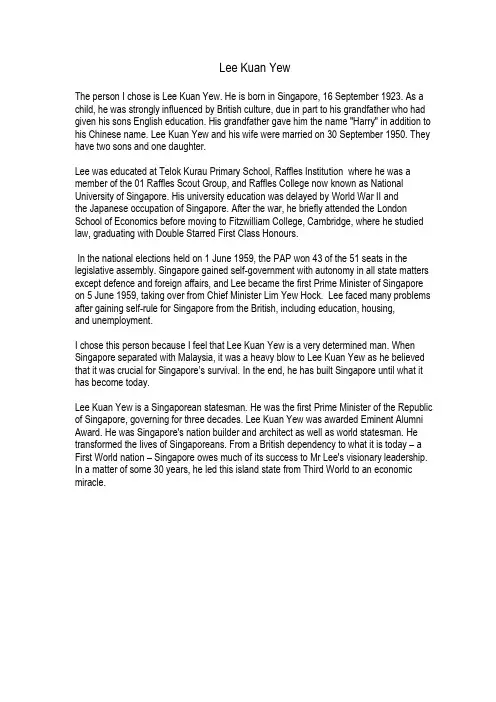
Lee Kuan YewThe person I chose is Lee Kuan Yew. He is born in Singapore, 16 September 1923. As a child, he was strongly influenced by British culture, due in part to his grandfather who had given his sons English education. His grandfather gave him the name "Harry" in addition to his Chinese name. Lee Kuan Yew and his wife were married on 30 September 1950. They have two sons and one daughter.Lee was educated at Telok Kurau Primary School, Raffles Institution where he was a member of the 01 Raffles Scout Group, and Raffles College now known as National University of Singapore. His university education was delayed by World War II andthe Japanese occupation of Singapore. After the war, he briefly attended the London School of Economics before moving to Fitzwilliam College, Cambridge, where he studied law, graduating with Double Starred First Class Honours.In the national elections held on 1 June 1959, the PAP won 43 of the 51 seats in the legislative assembly. Singapore gained self-government with autonomy in all state matters except defence and foreign affairs, and Lee became the first Prime Minister of Singapore on 5 June 1959, taking over from Chief Minister Lim Yew Hock. Lee faced many problems after gaining self-rule for Singapore from the British, including education, housing,and unemployment.I chose this person because I feel that Lee Kuan Yew is a very determined man. When Singapore separated with Malaysia, it was a heavy blow to Lee Kuan Yew as he believed that it was crucial for Singapore’s survival. In the end, he has built Singapore until what it has become today.Lee Kuan Yew is a Singaporean statesman. He was the first Prime Minister of the Republic of Singapore, governing for three decades. Lee Kuan Yew was awarded Eminent Alumni Award. He was Singapore's nation builder and architect as well as world statesman. He transformed the lives of Singaporeans. From a British dependency to what it is today – a First World nation – Singapore owes much of its success to Mr Lee's visionary leadership. In a matter of some 30 years, he led this island state from Third World to an economic miracle.。
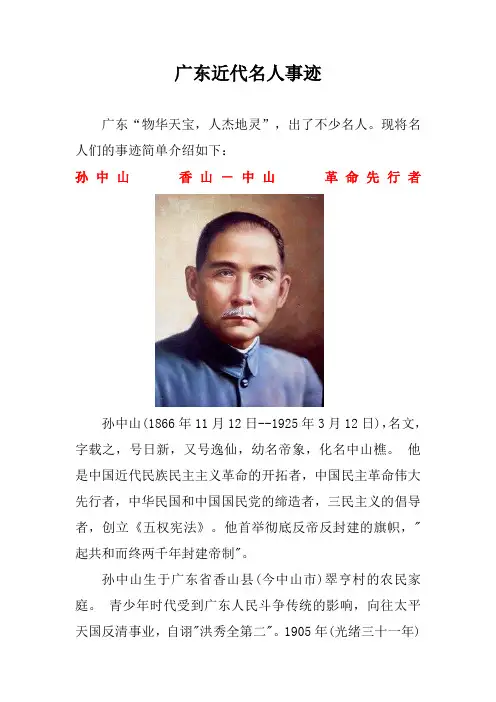
广东近代名人事迹广东“物华天宝,人杰地灵”,出了不少名人。
现将名人们的事迹简单介绍如下:孙中山香山-中山革命先行者孙中山(1866年11月12日--1925年3月12日),名文,字载之,号日新,又号逸仙,幼名帝象,化名中山樵。
他是中国近代民族民主主义革命的开拓者,中国民主革命伟大先行者,中华民国和中国国民党的缔造者,三民主义的倡导者,创立《五权宪法》。
他首举彻底反帝反封建的旗帜,"起共和而终两千年封建帝制"。
孙中山生于广东省香山县(今中山市)翠亨村的农民家庭。
青少年时代受到广东人民斗争传统的影响,向往太平天国反清事业,自诩"洪秀全第二"。
1905年(光绪三十一年)成立中国同盟会。
1911年10月10日(宣统三年)新军中的革命党人暗中联络,决定当天晚上起义。
辛亥革命后被推举为中华民国临时大总统(任期1912年1月1日--1912年4月1日)。
1925年3月12日孙中山在北京逝世,1929年6月1日,根据其生前遗愿,葬于南京紫金山中山陵。
1940年,国民政府通令全国,尊称其为"中华民国国父"。
孙中山著有《建国方略》、《建国大纲》、《三民主义》等。
其著述在逝世后多次被结集出版,有中华书局1986年出版的十一卷本《孙中山全集》,台北1969、1973、1985年出版的《国父全集》等。
孙中山为了改造中国耗尽毕生的精力,在历史上留下了不可磨灭的功勋,也为政治和后继者建立了坚固而珍贵的遗产。
李光耀梅州-大埔新加坡国父李光耀- 原新加坡总理、内阁资政李光耀,GCMG,CH(Lee Kuan Yew)(1923年9月16日(癸亥年)—2015年3月23日),新加坡华人,新加坡前总理(开国元首)、新加坡最高领导人,曾任国务资政以及内阁资政。
祖籍广东省梅州市大埔县高陂镇党溪乡。
新加坡莱佛士学院毕业。
1954年11月参与创建新加坡人民行动党。
曾任新加坡人民行动党秘书长、立法议会(1965年12月改称国会)议员、新加坡自治政府首任总理、总理公署高级部长、国际儒学联合会名誉理事长、内阁资政(总理公署)。

THE WISDOM OF LEE KUAN YEW On Japan defeating colonial power Britain to occupySingapore in 1942: The dark ages had descended on us. It was brutal, cruel. In looking back, I think it was the biggest single political education of my life because, for three and a half years, I saw the meaning of power and how power and politics and government went together.On the British who were trying to re-establish control after WWII: The old mechanisms had gone and the old habits of obedience and respect had also gone because people had seen them run away … the local population was supposed to panic when the bombs fell, but we found they panicked more than we did.On Australia, which he once warned was in dangerof becoming the white trash of Asia: I have to change my mind about your entrepreneurs. I’m not sure about your unions, but your entrepreneurs know what they’re up against and they’re moving worldwide.On opinion polls: I have never been over concerned or obsessed with opinion polls or popularity polls. I think a leader who is, is a weak leader.On popularity: Between being loved and being feared, I have always believed Machiavelli was right. If nobody is afraid of me, I’m meaningless.On his style of rule: Anybody who decides to take me on needs to put on knuckledusters. If you think you can hurt me more than I can hurt you, try.On the political fight: Everybody knows that in my bag I have a hatchet, and a very sharp one. You take me on,I take my hatchet, we meet in the cul-de-sac.On justice: We have to lock up people, without trial, whether they are communists, whether they are language chauvinists, whether they are religious extremists. If you don’t do that, the country would be in ruins. One-man-one-vote is a most difficult form of government.. Results can be erratic.At the Elysee Palace in Paris in September 1978 A fireside chat with US president George Bush in Tokyo in 1989Lee Kuan Yew at a rally for the People’sAction Party in August 1955 Social and health benefits are like opium or heroin. People get addicted and the withdrawal of welfare benefits is very painful. I am often accused of interfering in the private lives of citizens. Yes, if I did not, had I not done that, we wouldn’t be here today. And I say without the slightest remorse, that we wouldn’t be here, we would not have made economic progress, if we had not intervened on very personal matters – who your neighbour is, how you live, the noise you make, how you spit, or what language you use. We decide what is right. Never mind what the people think. Mine is a very matter-of-fact approach to the problem. If you can select a population and they’re educated and they’re properly brought up, then you don’t have to use too much of the stick because they would already have been trained. It’s like with dogs. You train it in a proper way from small. It will know that it’s got to leave, go outside to pee and to defecate. No, we are not that kind of society. We had to train adult dogs who even today deliberately urinate in the lifts. I started off believing all men were equal. I now know that’s the most unlikely thing ever to have been, because millions of years have passed over evolution, people have scattered across the face of this earth, been isolated from each other, developed independently, had different intermixtures between races, peoples, climates, soils… I didn’t start off with that knowledge.But by observation, reading, watching, arguing, asking, and then bullying my way to the top,that is the conclusion I’ve come to. We knew that if we were just like our neighbours, we would die. Because we’ve got nothing to offer against what they have to offer. So we had to produce something which is different and better than what they have. It’s incorrupt. It’s efficient. It’s meritocratic. It works. We are pragmatists… Does it work? Let’s try it and if it does work, fine, let’s continue it. If it doesn’t work, toss it out, try another one. We are not enamoured with any ideology.On death: Even from my sickbed, even if you are going to lower me to the grave and I feel that something is going wrong, I will get up.Swearing in of Singapore’s first prime minister on June 5, 1959。
关于李光耀的书
关于李光耀(英文名:Lee Kuan Yew)的书籍有很多,他是新加
坡的创国元勋和第一任总理,对新加坡的发展起到了重要作用。
以下
是一些关于他的重要著作:
1. 《新加坡转型之谜》(The Singapore Story: Memoirs of Lee Kuan Yew):这本书是李光耀自传的第一部分,记述了他自幼时
代到新加坡独立前的历程,以及他作为新加坡首任总理的执政经历。
2. 《新加坡挑战与机遇》(From Third World to First: The Singapore Story, 1965-2000):这是李光耀自传的第二部分,详细
描述了新加坡从独立到21世纪初期的发展历程,揭示了新加坡领导和
他个人在这个过程中所面临的挑战和机遇。
3. 《马哈迪与吴作栋·历程对话录》(Hard Truths to Keep Singapore Going):这是一本由李光耀与新加坡作家汤森德合著的书,记录了李光耀与其中两位马来西亚的前领导人马哈迪·莫哈末和吴作
栋的对话,涉及到新加坡与马来西亚之间的复杂关系和历史背景。
4. 《执政的艺术》(The Art of Leadership: Perspectives from Lee Kuan Yew):这本书是基于李光耀的演讲和谈话整理而成的,总结了他的领导哲学和管理智慧,围绕政治、经济和外交等问题提供
了他的观点和见解。
这些书籍都是了解李光耀及新加坡历史和政治发展的重要参考资料,通过阅读可以更全面地了解他对新加坡的贡献和影响。
还有其他
一些关于李光耀的书籍,你可以根据自己的兴趣和需要进行进一步的
搜索和阅读。
李光耀发言稿英文I am honored to stand before you today as we gather to discuss the future of our great nation, Singapore. It is a privilege for me to address you on this occasion and share my vision for the nation I helped to build.Let me begin by stating that Singapore's success story is not just about economic prosperity, but it is also about social progress and political stability. Over the years, we have witnessed remarkable growth in our economy, leading to higher standards of living for our people. However, this growth did not come without its fair share of challenges.When we first embarked on our journey as an independent nation, we faced numerous obstacles. We lacked natural resources, had limited land, and a population with diverse ethnic backgrounds. Many doubted whether Singapore would be able to survive, let alone prosper. But we were determined to prove them wrong.As the first Prime Minister of Singapore, I knew that we needed a strong and disciplined government to guide our nation through the difficult times. We implemented policies that would accelerate our economic growth and provide opportunities for all our citizens. We focused on education, infrastructure development, and attracting foreign investments. Education became a cornerstone of our success. We placed a strong emphasis on educating our youth, ensuring that they had the skills and knowledge needed to compete in a globalized world. We invested heavily in building schools and universities, and we provided scholarships to bright and talented individuals, regardless of their social or economic background.Infrastructure development was another priority. We recognized that in order to attract foreign investors and compete with other countries in the region, we needed to have a world-class infrastructure. We built modern airports, seaports, and highways, making Singapore a hub for international trade and commerce.The success of our economic policies can be attributed, in part, to our ability to attract foreign investments. We created a business-friendly environment with low taxes, minimal regulations, and corruption-free governance. By positioning ourselves as a global financial center, we were able to attract multinational corporations, creating jobs and driving economic growth.But economic success alone was not enough. We needed to ensure social progress for all our citizens. We implemented policies that aimed to uplift the standard of living, provide housing for all, and provide affordable healthcare and education. We invested in public housing, ensuring that everyone had access to decent and affordable accommodation. We also introduced a comprehensive healthcare system that provided affordable medical care to all our citizens.Political stability was crucial for the success of our nation. We recognized the importance of strong institutions and a corruption-free government. We upheld the rule of law and created an independent judiciary that protected the rights and freedoms of our citizens. We also implemented strict anti-corruption measures and established a robust civil service that was accountable to the people.The success of our economic and social policies can be seen today. Singapore has transformed from a third-world country to a first-world nation in just a few decades. We have one of the highest per capita incomes in the world, a world-class education system, and a high standard of living for all our citizens. Our healthcare system is ranked among the best in the world, and our infrastructure is second to none.But our journey is far from over. As we look to the future, we must continue to evolve and adapt to the changing global landscape. We must embrace technology and innovation, invest in research and development, and ensure that our workforce is equipped with the skills needed for the jobs of tomorrow.We must also address the challenges of an aging population and shrinking workforce. We need to find innovative solutions to ensure that our elderly are well taken care of and that our younger generation has the opportunity to succeed and thrive. This may involve rethinking our retirement age, promoting lifelong learning, and encouraging immigration. As we navigate through these challenges, we must not forget the importance of social harmony and racial integration. Singapore is a multi-ethnic and multi-religious society, and we must ensure that all our citizens feel included and valued. We must continue to build bridges between different communities, promote interfaith dialogue, and celebrate our diversity.In conclusion, the success of Singapore is a testament to the resilience, determination, and hard work of our people. We have overcome numerous challenges in the past, and I am confident that we will continue to do so in the future. As we move forward, let us remember that the success of our nation is not just measured by economic indicators, but also by the well-being and happiness of our citizens.Thank you, and may God bless Singapore.。
董事长寄语英文翻译【篇一:董事长的欢迎致辞翻译】欢迎致辞尊敬的各位领导、各位来宾,同志们、朋友们:distinguished leaders, distinguished guests, my dear friends and comrades: 大家好! hello everyone!在这金橘满枝、硕果累累,充满丰收喜悦的美好时节,由山东布莱凯特黑牛科技股份有限公司主办的第18届国际动物繁殖生物技术大会在美丽的淄博隆重举行,这是布莱凯特的荣幸,是对我们做好布莱凯特黑牛品种培育及产业化开发各项工作的鼓励和鞭策。
在此,我谨代表山东布莱凯特黑牛科技股份有限公司全体员工向这次会议的召开致以热烈的祝贺!向不辞辛劳、远道而来出席本次国际大会的各位领导、各位专家表示热烈的欢迎!对国际动物繁殖生物技术协会为我们提供了这样一次聆听指导、学习先进、交流经验、广交朋友的宝贵机会表示衷心的感谢!下面,请允许我对我公司进行简短的介绍。
山东布莱凯特黑牛科技股份有限公司是于2004年9月创建的高新技术型企业,公司注册资本5130万元,占地面积2500亩。
先后被评为国家农业综合开发产业化重点龙头企业、全省先进科普示范基地、山东省农业产业化重点龙头企业、国家农业标准化示范区、国家肉牛标准化养殖示范场,建有山东省黑牛繁育工程技术研究中心。
公司多年来主持承担了多项国家级和省部级项目,填补了多项国际、国内空白。
2009年在国内首次培育出高档优质肉牛新种质—布莱凯特黑牛,达到国内领先水平,肉质可与日本神户牛肉相媲美。
生产的高档牛肉已经进入北京、上海、广州、深圳等高端消费市场。
2010年获首届黄河三角洲高效生态农业投资贸易洽谈会金奖,2012年荣获首届中国牛肉美食烹饪大赛特优食材奖。
目前已经形成了集布莱凯特黑牛繁育、育肥、屠宰加工、市场营销、生态农业和酒店餐饮于一体的产业链条。
承担的布莱凯特黑牛产业开发项目,被列入山东省黄河三角洲高效生态经济区重点建设项目、山东省“十二五”农业领域七大振兴产业项目,科技部成果转化资金重大专项。
A N E WB O O K F R O MA MEMBER OF thE ENglish/MAlAy NEWspApER divisiON Mezzanine Floor, information Resource Centre level 3, podium Block singapore press holdings 1000 t oa payoh North News Centre singapore 318994t el: (65) 6319 6319, Fax: (65) 6319 8258Email: stpressbooks@.sg Online bookstore: .sg Lee Kuan Y ew: One Man’s View of the World“Lee Kuan Yew’s unique talents built a nation and helped secure an era of peace and prosperity in Asia. For decades it has been my good fortune to know him as a strategic thinker, a partner in international security, and a friend. Now, on the occasion of his 90th birthday, he has distilled his thinking on international affairs for a broader audience. With fresh and candid analyses of subjects ranging across the globe, One Man’s View of the World demonstrates the acute insights that fellow leaders have sought from Lee Kuan Yew for half a century.”— Dr Henry A. Kissinger, US Secretary of State, 1973–1977“Lee Kuan Y ew once again gives us clarity of thought, eloquence of expression, the depth of important ideas, and common sense. A must-read book!”— George P. Shultz, US Secretary of State, 1982–1989“Insightful, well thought, penetrating and visionary. Lee Kuan Yew’s assessment and analysis of these countries and the future of Singapore is truly par excellence and could only come from one of the finest statesmen of this region and our time. It will be a much referenced book for those who need to understand where we are and where we will be.”— Tun Daim Zainuddin, Malaysian Finance Minister, 1984–1991 and 1999–2001Margaret Thatcher read all his speeches while she was in office and declared he was never wrong. Richard Nixon called him “a world statesman of the first rank”.Born in 1923, Singapore’s former Prime Minister Lee Kuan Yew has spent a lifetime being intimately involved in international affairs. He has met every major Chinese leader from Mao Zedong to Xi Jinping and hobnobbed with American presidents from Lyndon Johnson to Barack Obama.In this book, Lee draws on that wealth of experience and depth of insight to offer his views on today’s world and what it might look like in 20 years. This is no dry geopolitical treatise. Nor is it a thematic account of the twists and turns in global affairs. Instead, in this broad-sweep narrative that takes in America, China, Asia and Europe, he parses their society, probes the psyche of the people and draws his conclusions about their chances for survival and just where they might land in the hierarchy of tomorrow’s balance of power. What makes a society tick? What do its people really believe? Can it adapt? In spare, unflinching prose that eschews political correctness, he describes a China that remains obsessed with control from the centre on its way to an unstoppable rise; an America that will have to share its pre-eminence despite its never-say-die dynamism; and a Europe that struggles with the challenges of keeping its union intact. His candid and often startling views – on why Japan is closed to foreigners, why the Arab Spring won’t bring one man, one vote to the Middle East, and why preventing global warming is not going to be as fruitful as preparing for it – make this a fresh and gripping read. Lee completes the book by looking into the future of Singapore – his enduring concern – and by offering the reader a glimpse into his personal life and his view of death. The book is interspersed with a Q&A section in each chapter, gleaned from conversations he had with journalists from The Straits Times .Contents: China —A strong centre • America —Troubled but still on top • Europe —Decline and discord • Europe —Decline and discord • Japan —Strolling into mediocrity • North Korea —A grand hoax • India —In the grip of caste • Malaysia —A different path • Indonesia —Moving away from the centre • Thailand —An underclass stirs • Vietnam —Locked in a socialist mindset • Myanmar —The generals change course • Singapore —A nation at a crossroads • Middle East —A spring without a summer • Global Economy —What next? • Energy and Climate Change —Preparing for the worst • Personal Life —Choosing when to go • Conversations with an old friendThe Author: Lee KuanYew was born in 1923 when Singapore was part of the British Empire and came to adulthood when the Japanese invaded and named the island Syonan-to. After the Second WorldWar, he went on to Cambridge University where he got a double-starred First in law. He became Singapore’s first prime minister in 1959, when Singapore was self-governing, and led the country to full independence in 1965. He is credited with leading Singapore from the Third World to the First, turning a trading outpost into a global metropolis known for its efficient and non-corrupt system of governance. After stepping down as prime minister in 1990, he stayed on in the Cabinet as senior minister and minister mentor until 2011. Lee is widely admired as an international statesman, and his views on China, America and Asia are well-respected and sought after by global leaders. He sits on the International Advisory Committee of T otal S.A. and the International Council of JP Morgan Chase. He is also senior advisor to the Government of Singapore Investment Corporation.ISBN: 978 981 4342 56 8Size: 152 x 227 mm 352 pp plus 48 pp photographs Hardback S$39.90 (includes GST)。